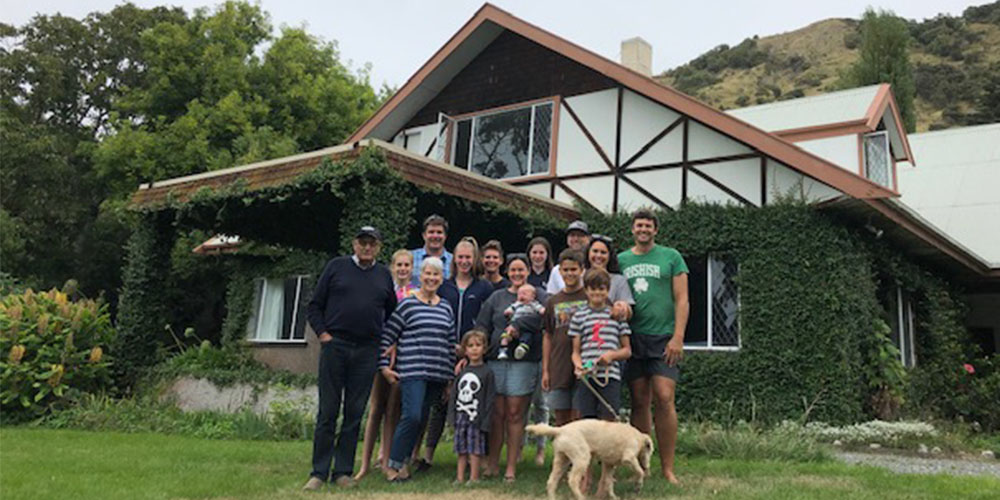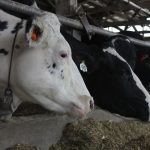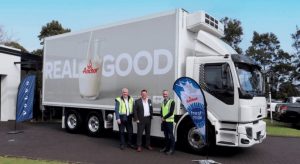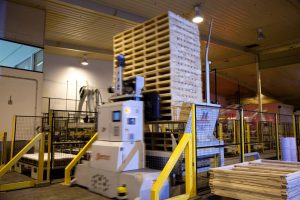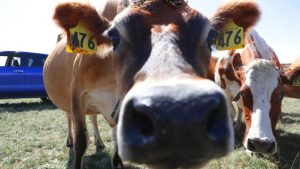
Five generations ago, in 1842 Graeme Sutton’s English family landed in Nelson.
It was the start of a family partnership that has endured and expanded into several irrigated dairy ventures.
“The reason they came out, I understand, is that New Zealand gave them an opportunity for land ownership. They never had that in England. They just worked for a Lord,” Graeme says.
Settling in Richmond under the Wakefield scheme the Suttons made sure they stuck together to throw off those shackles and Sutton continues to be inspired by the example of his self-sufficient forebears.
“My grandfather and his brother farmed together, my father and his brother farmed together and my brother Colin and I farmed together.”
The Suttons are a practical lot – a trait that shone through when Graeme’s father and a brother dissolved their partnership to make room for the next generation.
Graeme’s immediate family moved to a farm at Redwood Valley, near the property where Graeme and his wife Jan are today.
He says the old Redwood Valley plot convinced him of a few important things about dairying.
“It was dryer land needing irrigation.
“And, I have to say, I wasn’t that keen about milking cows and shifting irrigation pipes, lugging these aluminium pipes around.”
The irony of later becoming a long-time chairman of Irrigation NZ does not escape him.
In the early 1960s his dad Victor bought a high-country farm at Kikiwa near Murchison, in the Nelson Lakes hinterland. The move was meant to guard against drought in Redmond Valley and create a farming outlet for a new generation.
The block was carved out of native bush as a ballot farm for returning World War I servicemen. It was covered with stumps and logs when the Suttons came across it but Graeme saw more potential than his dad.
“I think he bought it with a view of running drystock but I had other ideas and we soon developed it into a pretty effective sheep and beef unit.”
He initially farmed Kikiwa with Victor and older brother Ross. Together they spent countless hours earthmoving – a job that appealed so much to machinery-loving Ross he decided to pursue a career in logging and contracting.
Looking for a new partner Graeme turned to younger brother Colin, forming the bedrock for a 30-year agribusiness platform built on irrigated dairy farms in North Canterbury.
They soon settled into their preferred roles: Colin managed the dairy at Redwood Valley while Graeme managed Kikiwa.
It was winning a prestigious Romney breeder award in the 1980s that piqued his interest in agri-politics.
At the time he was the first South Island farmer outside the Romney fortress of Southland to take the title. Well-wishers soon suggested he should use his new-found profile to advocate for other farmers.
He took the hint and was elected to the Ravensdown board and the meat and wool industry’s now-defunct electoral committee.
In those days the sheep and beef industry had some pretty woolly thinking, he says.
“That was when Alliance took over a farmer co-op and PPCS was trying to get a foothold to take over some of the bigger private companies.
“I remember asking one of the older guys at that meeting had industry ever looked at the Dairy Board model for marketing. And one of these guys looked over his glasses at me and said ‘Boy, boy, you go home and wash your mouth out with soap’.”
He wasn’t put off.
He became sure of his view of the meat and wool industry when economist Rob Davison presented a paper to the electoral committee saying dairying was generating an average annual return of 6-7%, compared to about 3% in sheep in beef.
Fortified by economic fact, Graeme and Colin decided they could do better than being cash poor for the rest of their farming lives.
In the early 1990s they started looking for an investment farm, using existing capital as leverage for lending.
After looking at options on the West Coast and in Golden Bay their Nelson accountant Bronwyn Monopoli pointed them to Culverden in North Canterbury. Monopoli knew the area from horse-riding and friends on a local farm, Mt Palm.
The Suttons missed out on a first Culverden farm bid but Colin soon found an alternative, the 700ha Inniskillen. The only hitch was the Christchurch owners’ fear the staff would walk out as soon as they heard the property was on the market.
It meant the defining moment in their agri career had to be of bit cloak-and-dagger.
“It was on the market but it wasn’t advertised. They wanted to sell it quietly, mainly because they had staff on the place and they didn’t want them to know it was being sold till it actually was.
“They knew they didn’t have the ability to go up and farm it so we had to visit on a day when the manager was away. It was all very hush-hush.”
Dairy farmers were a novelty around Culverden at the time.
When the Suttons took over Inniskillen in January 1993 there were just four other dairy farms in the surrounding Amuri Basin.
The new owners soon converted Inniskillen into three separate units, each with its own milking shed and border-dyking. The irrigation was considered a local wonder in its day, impressing judges enough to make the Suttons finalists in the 1997 South Island Farmer of the Year competition.
But it was still an uneasy time for Culverden as the area waited for the fruits of the long-awaited Amuri Irrigation scheme to appear.
“I think a lot of people found that after the downturn of the 80s, with irrigation coming they had an opportunity to get out. And a lot of them did.”
The Suttons missed the cut on eligibility for an irrigation subsidy when they bought Inniskillen but they were confident irrigation would pay for itself anyway.
Within a few years Graeme was happy to speak at farming events about the power of water.
He recalls telling a Massey University conference that where previously Inniskillen might have carried the equivalent of three halfbred Merinos to the acre, under irrigation it could carry three cows to the hectare. Looking back now, he has no doubt irrigated farming has rescued run-down communities.
“Some of the land in Culverden is quite light, stony soil and it responds quite well to water. Irrigation really turned the whole dairy thing around in Canterbury.”
As a champion for irrigation interests he is confident farmers can control nutrient leaching on lighter, Culverden-like land.
“With proper irrigation and proper management, except for high rainfall events, you can actually farm with virtually no nutrients dropping out the bottom at all.”
Farming should be guided by science, not arbitrary rules, he says.
To that end Irrigation NZ always favoured self-government, self-responsibility and putting pressure on non-performing neighbours.
“Farmers have always responded to the science that’s there and have always found a way, from those developments, to actually deal with the problem. I believe that we’ll do that.”
Outside farming Graeme is a long-time electorate chairman for National MP and former Cabinet minister Nick Smith.
Philosophically, he’s no great fan of red tape.
“At the end of the day I guess you have to have regulations as a backstop but it wants to be that rather than some of the policies I see, looking like this Government are going to do, it will actually build a wall between farmers and government regulators.”
It is unlikely influential regional councils like Environment Canterbury (ECan) would want to drive that wedge either, he says.
“They’ve really led the whole field and there’s been a real good relationship between ECan, Irrigation NZ and Dairy NZ to work together to get the solution.”
He credits his father and uncle for giving him a solid start in farming through Jersey breeding.
The key period for the older folks was the early 1960s, before artificial insemination, when the West Coast was establishing itself in dairying.
“People had to have bulls so they had an annual sale and they used to sell as many bulls as they did heifers. They did well out of that.”
A jewel in the breeding operation was a bull that ranked highly on a production score but failed to impress the show judges with female progeny.
“They didn’t win the prize for the best looking cows but they certainly did when it came to measuring what went in the bucket.”
A busy man
Graeme Sutton has been a farmer for more than 40 years in the Nelson and North Canterbury areas, farming a mixture of sheep, beef, deer and dairy.
As an equity partner in several dairy farms over the past 25 years Graeme is a strong believer in the power of individual farmers to pool their financial and mental resources.
“Colin and I did far more doing it collectively than we could have ever done on our own.”
In partnership with others Graeme farms three dairy units milking 4500 cows.
He has been involved in several agri-business organisations as a director, including fertiliser, meat, wool, dairy and irrigation and spent 15 years in electricity industry governance.
Graeme has also played an active role in Federated Farmers and the Deer Farmers Association. He is also a director of Crown Irrigation; chairman of Provelco and immediate past chairman of Irrigation NZ and was chairman of the Industry Training Organisation before a merger with Primary ITO. He is also a member of the Institute of Directors, Justice of the Peace and a Rotarian.
In February Graeme and his wife Jan had a close shave at Redwood Valley. On the first day of the Nelson fires they were evacuated and forced to move cattle and deer to a less vulnerable part of the property.
The farm and family escaped disaster but it was a heck of a shock, Graeme says.
